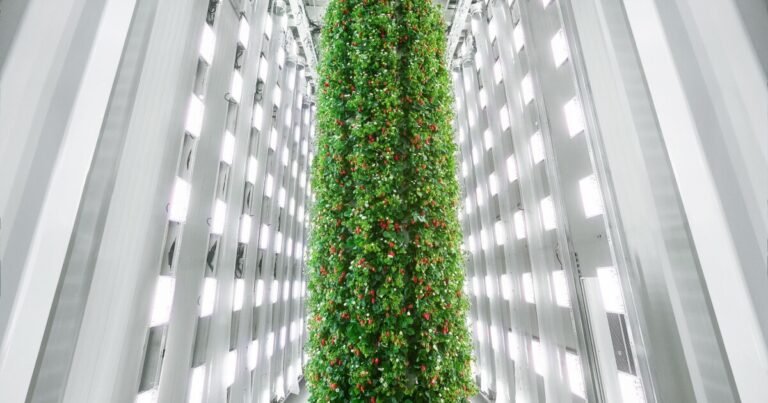A major step towards better, sustainable and affordable food production without environmental issues has been taken with the opening of “the world’s first large-scale indoor vertically grown berry farm” in Richmond, Virginia. The farm is backed by an international team of scientists who believe this new phase of agriculture is a way to ease the world’s food demand.
Plenty Richmond Farm is designed to produce more than 4 million pounds (1.8 million kg) of strawberries grown indoors vertically in 30-foot (9-meter)-tall towers using 40,000 square feet (just under one acre) of land – a fraction of the land required for traditional strawberry production, which is subject to seasonal and environmental factors that limit yields.
Global company Driscoll’s strawberries are expected to be on grocery store shelves in early 2025, the company said.
“Plenty’s farms will boost local agricultural production and drive economic development while diversifying risk and protecting the environment,” said Virginia Governor Glenn Youngkin. “We look forward to supporting their innovative approach as they revolutionize the industry.”
Many
Until now, commercial plant-based vertical farms have been limited primarily to producing lettuce, but this latest technological advancement expands the range of crops that can be grown. The 12 growing “chambers” control temperature, light, and humidity, and are also designed to be more efficient at pollinating plants than honeybees. Ultimately, the company believes this will result in more uniform fruit and less waste.
“This farm is a model for the positive impact that climate-neutral agriculture can have and proof that vertical farming can deliver the crop diversity, large-scale, local production needed to future-proof our global food system,” said Plenty CEO Alama Kukutai. “Plenty Richmond Farm is the culmination of 200 research trials over the past six years to perfect growing strawberries that taste at their peak, indoors, consistently year-round. Driscoll’s has set an incredibly high standard for berry quality, and we are thrilled to join forces to consistently deliver ultra-premium Driscoll’s strawberries year-round.”
Filmed a year ago, the video shows the company’s early efforts to establish a vertical farming model that would allow it to produce high-yield, year-round food on such a small amount of land.
Abundance—Creating Compton’s agricultural future
The opening of this first vertical farm marks the culmination of years of scientific research into this model, conducted by a global team from organisations including the University of Queensland, Macquarie University, Wageningen University, University of Florida, University of the Basque Country, the CAS Centre of Excellence in Molecular Plant Sciences and the Shanghai Institute of Plant Physiology and Ecology.
“Vertical farms grow crops indoors in stacks, providing consistent yields and quality, but they also use huge amounts of expensive energy for light and airflow,” said Paul Gautier, professor of conservation crop science at the University of Queensland in Australia. “By creating a more dynamic environment, where lights and sensors switch on and off during the day in sync with the photosynthetic cycle rather than always being on, we can maximize the benefits of vertical farms while taking advantage of cheaper energy during off-peak hours.”
“When everyone was saying the best strawberry yield you could produce in a greenhouse was 2kg (4.4 pounds), I was able to produce 6kg (13 pounds) of strawberries per plant,” he added. “By changing the environment and pushing it to its limits, I tripled my strawberry yield.”
Richmond Farm uses 97% less land and up to 90% less water than conventional agriculture, eliminates the use of pesticides and reduces pathogenic risks to crops through a controlled environment and short supply chain.
“I would like to see protected and controlled environment agriculture treated as an independent branch of plant science,” Gauthier added. “If we want to increase food production by 70 percent by 2050, we need to look at things differently.”
“Vertical farming makes this possible. This wasn’t possible before,” he added.
“By combining our 100 years of agricultural expertise and unique varieties with Plenty’s cutting-edge technology, we can deliver locally grown vegetables with the consistent taste and quality our customers love,” said Soren Bjorn, CEO of Driscoll’s. “This new innovative farm is a major step forward as we continue to drive the growth of the category in new ways for our customers and consumers.”
The research was published in the scientific journal Frontiers in Science.
Source: University of Queensland, Plenty, PR Newswire




